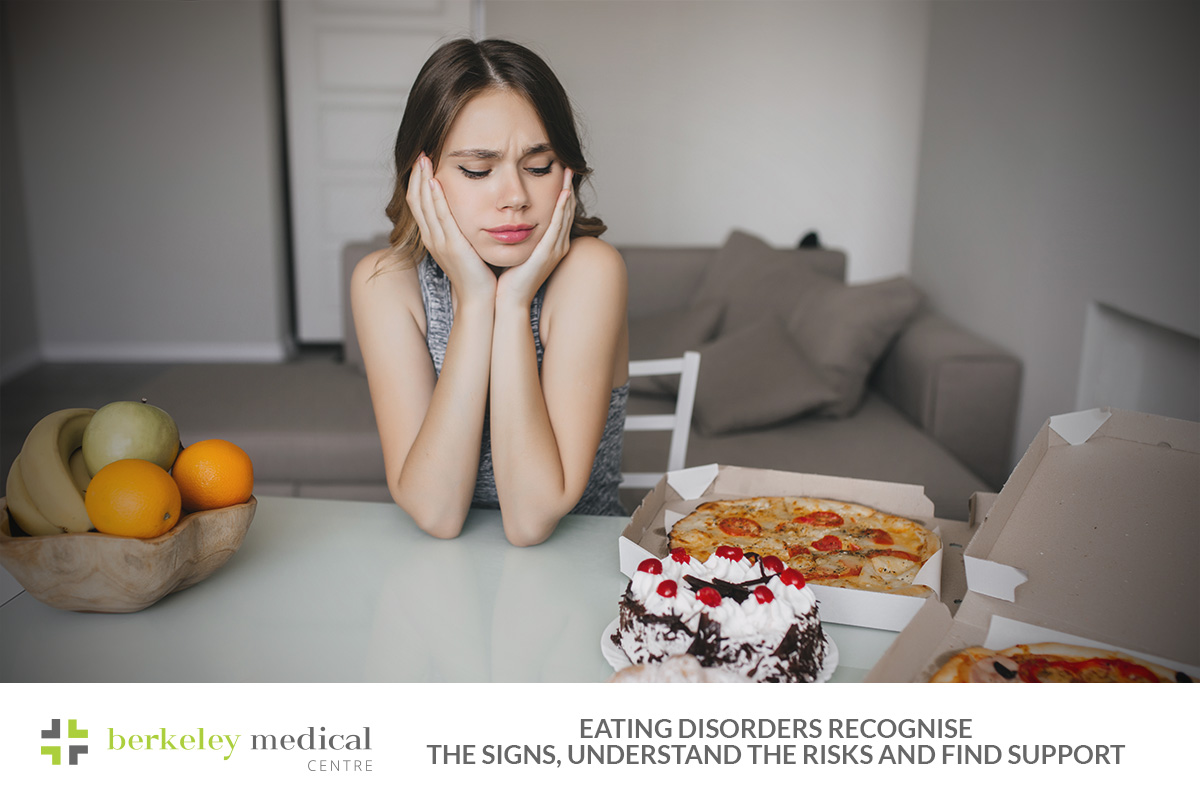Eating disorders are serious mental health conditions that affect people of all ages, genders and backgrounds. Despite common stereotypes, these disorders go far beyond dieting or weight obsession they are complex illnesses that involve disordered thoughts and behaviours related to food, eating and body image.
If you or someone you care about is showing signs of an eating disorder, seeking early support from a General Practitioner (GP) can be life-changing. With the right care and understanding, recovery is not only possible it is achievable.
In this article, we explain the types of eating disorders, common warning signs, underlying causes and how GPs and allied health professionals can help patients in receive the treatment they need.
What Are Eating Disorders?
Eating disorders are serious, often life-threatening conditions that impact a person’s physical health, emotional wellbeing and social life. They involve unhealthy patterns of eating, obsessive thoughts about weight or appearance and in many cases, co-existing mental health issues such as anxiety or depression.
Contrary to popular belief, not everyone with an eating disorder is underweight. Many people appear healthy while silently struggling, which is why early intervention and professional medical assessment are so important.
Common Types of Eating Disorders
Understanding the differences between eating disorders is key to recognising them early and offering effective support.
Anorexia Nervosa
This disorder involves severe food restriction, intense fear of weight gain and a distorted body image. People with anorexia may become dangerously underweight, though they often still feel “too big.”
Bulimia Nervosa
Bulimia includes episodes of binge eating followed by purging behaviours like vomiting, laxative use or excessive exercise. These cycles can lead to serious heart, digestive and dental problems.
Binge Eating Disorder (BED)
BED is characterised by repeated episodes of uncontrolled eating without purging. Individuals often feel guilty or ashamed and may gain significant weight, leading to health complications such as type 2 diabetes and high blood pressure.
Avoidant/Restrictive Food Intake Disorder (ARFID)
ARFID involves extreme avoidance of certain foods due to texture, fear of choking or low interest in eating not driven by body image concerns. It often results in nutritional deficiencies, especially in children and adolescents.
Other Specified Feeding or Eating Disorders (OSFED)
This category includes serious eating behaviours that do not meet full criteria for the above disorders but still require clinical attention.
Warning Signs and Symptoms of Eating Disorders
Recognising the early signs of an eating disorder can be the first step toward recovery. While symptoms vary, common red flags include:
- Sudden weight loss or gain
- Skipping meals or rigid eating habits
- Intense fear of gaining weight
- Excessive focus on food, calories or appearance
- Compulsive exercise
- Digestive issues without clear medical cause
- Mood swings, anxiety or withdrawal
- Frequent trips to the bathroom after eating
- Hiding or hoarding food
It is important to remember that disordered eating can affect anyone, including individuals with a “normal” BMI. That’s why GPs rely on more than just weight to assess a patient’s health.
What Causes Eating Disorders?
Eating disorders are complex and multifactorial. They often result from a combination of biological, psychological and social influences.
Biological Factors
Genetics may increase a person’s vulnerability, especially if there is a family history of eating disorders or other mental health conditions.
Psychological Factors
Low self-esteem, perfectionism, past trauma or co-occurring mental illnesses such as anxiety or depression are common risk factors.
Environmental and Social Pressures
Media portrayal of thinness, diet culture, bullying and peer pressure can significantly influence body image particularly in adolescents and young adults.
Life Transitions or Stressful Events
Periods of change such as puberty, pregnancy, university or relationship breakdowns can trigger or worsen disordered eating behaviours.
Understanding the causes can help reduce stigma and reinforce the fact that eating disorders are not a choice they are treatable medical conditions.
Health Risks of Untreated Eating Disorders
Left untreated, eating disorders can cause long-term physical and emotional damage, including:
- Malnutrition and vitamin deficiencies
- Electrolyte imbalances and heart complications
- Osteoporosis and bone fractures
- Menstrual irregularities or infertility
- Tooth erosion and gastrointestinal problems
- Social isolation and relationship breakdowns
- Severe depression or suicidal thoughts
Because eating disorders impact both the mind and body, a holistic treatment plan led by healthcare professionals is essential for recovery.
How GPs Can Help with Eating Disorders
Visiting a General Practitioner in is often the first and most important step toward healing. GPs are trained to identify the early warning signs of eating disorders and can coordinate multidisciplinary treatment plans based on individual needs.
Your GP can:
- Perform physical health assessments
- Provide Mental Health Care Plans
- Monitor weight and vital signs
- Refer you to psychologists, dietitians or psychiatrists
- Offer ongoing support and non-judgmental care
- Involve family or carers when appropriate
- Review progress and adjust your treatment plan over time
Through early intervention and consistent care, GPs help patients manage both the physical effects of disordered eating and the emotional struggles that often accompany it.
When to Seek Help for an Eating Disorder
If you notice any signs of disordered eating in yourself or a loved one, it is time to reach out. You do not need to wait for symptoms to get worse or for a formal diagnosis to speak to a healthcare professional.
Early support can lead to better outcomes, shorter treatment times and a stronger chance of full recovery. Whether it is a concerned parent, a worried partner or an individual seeking help, starting the conversation with a GP can make all the difference.
How Berkeley Medical Centre Can Help
At Berkeley Medical Centre in Kenmore, our experienced General Practitioners work closely with psychologists, dieticians and other allied health professionals to support patients with eating disorders.
We provide:
- Early screening and diagnosis
- Personalised mental health care plans
- Chronic disease management (if required)
- Ongoing monitoring and coordinated care
- Referrals to trusted specialists across Queensland
Whether you are concerned about your own health or worried about someone close to you, our team is here to listen and guide you with care and confidentiality.
Final Thoughts: Support Is Closer Than You Think
Eating disorders are complex, but recovery is possible with the right treatment and support. Whether the journey involves overcoming anorexia, bulimia, binge eating or another form of disordered eating, medical and mental health professionals in Brisbane are ready to help. If you are feeling overwhelmed, remember that you do not have to go through this alone. Taking the first step to seek help could be the most important choice you make for your future wellbeing.







